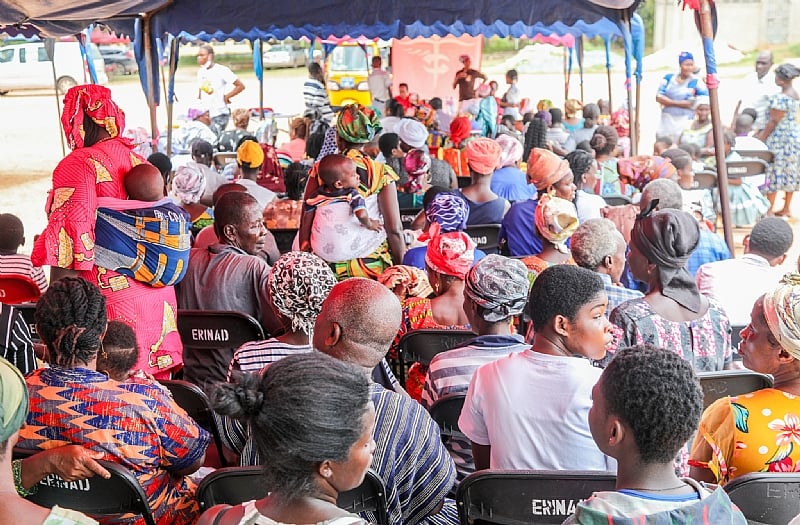Healthcare encompasses more than just medical treatments; it includes support systems vital for restoring dignity to patients facing various health challenges. One key aspect of healthcare in Africa is the financial burden placed on patients, with more than 70% of health costs being covered out-of-pocket, according to the World Health Organization (WHO) in 2020. This situation highlights the need for interventions aimed at reducing the financial strain for patients, thereby contributing to the overall well-being of the population. Recognizing this need, Newmont partnered with Project C.U.R.E., a U.S.-based non-governmental organization, to establish community clinics dedicated to providing essential healthcare to the host communities surrounding its Akyem Mine, located in Birim North District in the Eastern Region of Ghana. These clinics focus on a variety of health services including health screenings, eye care, malaria treatment, blood sugar monitoring, and general health consultations.
One of the individuals profoundly impacted by this initiative is Comfort Krampah, a 38-year-old resident of Adausena. As a primary caregiver for her six-year-old daughter, Asantewaa, who lives with cerebral palsy, Comfort faces significant challenges in managing the needs of her daughter and her other two children. The physical and emotional toll of caregiving, combined with a lack of support, has made Comfort’s situation increasingly difficult. However, during a health screening event in September, Comfort’s struggles were recognized when medical professionals assessed her daughter’s condition. They promptly arranged for further assistance from the Adausena Health Centre, including the provision of a wheelchair and additional medical support for the family. This intervention made a monumental difference in Comfort’s life, offering her hope and critical support in her daily responsibilities.
The healthcare initiative led by Newmont and Project C.U.R.E. was not just limited to individual cases like Comfort’s; it provided extensive services to the broader community. The five-day free health screening attracted over 1,200 residents, offering comprehensive health assessments, expert consultations, medical devices, and referrals for more serious health conditions. The medical team, comprised of 40 members with diverse specialties—including doctors, nurses, dentist, ophthalmologists, and various support staff—worked collaboratively to ensure that community members received the care they urgently needed. This vast participation underscores the importance of accessible healthcare services in rural areas, where paternalistic healthcare models often fail to meet the population’s needs adequately.
Robert Owusu-Bempah, the Acting General Manager for Newmont’s Akyem Mine, emphasized the commitment of the organization to improve the health status of community members. His statement, “Newmont believes that every small gesture counts,” reflects the company’s long-standing partnership with Project C.U.R.E and the Birim North District Health Directorate. These collaborative efforts are specifically designed to address the healthcare needs of local communities and enhance their overall quality of life. The organization’s strategic approach highlights the significance of partnerships and community-driven initiatives in overcoming barriers to healthcare access and affordability.
The impact of such initiatives extends beyond immediate health benefits, as they also contribute to a sense of community and belonging among the residents. Individuals like Comfort Krampah share their experiences not just to highlight personal struggles, but to demonstrate the broader challenges faced by many in similar situations. By raising awareness and touching the lives of individuals in the community, programs like those organized by Newmont and Project C.U.R.E. foster a supportive environment that encourages individuals to seek medical assistance and share their stories. These narratives often serve as catalysts for change, inspiring further interventions that can alleviate the financial and emotional burdens faced by countless families.
Ultimately, the collaboration between Newmont and Project C.U.R.E. exemplifies a thoughtful approach to addressing healthcare disparities in Africa. By focusing on the tangible needs of communities, these organizations play a pivotal role in mitigating the overwhelming out-of-pocket expenses that plague many families. The positive outcomes witnessed in individuals like Comfort Krampah, as well as the broader community’s engagement during health screenings, illustrate how targeted health interventions can transform lives. As more organizations recognize the importance of supporting community health initiatives, there is hope for a healthier, more resilient population in regions currently grappling with healthcare challenges.


